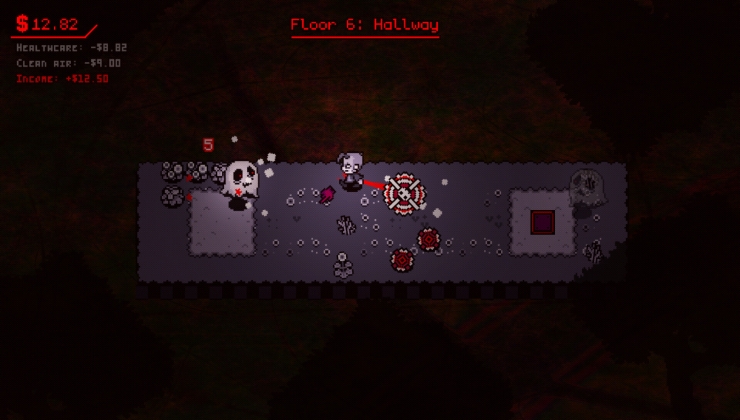In a move that's going to raise a lot of eyebrows, Microsoft has joined the Open Invention Network to 'protect Linux and other important open source workloads from patent assertions'.
For those who haven't heard of the OIN, their mission statement is quite a simple and honourable one "The Open Invention Network is a shared defensive patent pool with the mission to protect Linux.". To find out more about the OIN see here.
Hold the phone, this isn't gaming news?
Correct. However, this is still very interesting and extremely surprising from a company that has been pretty hostile to Linux in the past. It's the kind of move that could result in some big shifts in the entire industry.
We know Microsoft’s decision to join OIN may be viewed as surprising to some; it is no secret that there has been friction in the past between Microsoft and the open source community over the issue of patents. For others who have followed our evolution, we hope this announcement will be viewed as the next logical step for a company that is listening to customers and developers and is firmly committed to Linux and other open source programs.
Surprising is one word for it! Honestly, I'm in shock at this news. Does this mean we can firmly put the "Embrace, extend, and extinguish" phrase to rest and replace it with Embrace, extend, and protect? With Microsoft joining, they're bringing with them around 60,000 patents.
Moves like that, makes me seriously think about how Microsoft have changed, especially since their previous CEO Steve Ballmer called Linux "a cancer".
I think it also shows how far Linux has come as a platform for all things too, especially with Microsoft having a "Windows Subsystem for Linux" along with their support for running Linux on their Azure cloud computing platform.
What do you think to this?
I'm honestly surprised at many of the responses here. It looks like you haven't really been in touch with the IT world in at least ten years?
It's fair enough to be sceptical, I can totally relate to that, but over the last 5-6 years there's been significant policy changes in how Microsoft has approached open source in general and Linux in particular. So much so that it's made nonstop headlines in the IT press. Hence my surprise.
Their dedication is of a very wide nature and involves a lot of areas. Examples are aplenty: Linux version of Visual Studio Code (and a bloody good editor it is too) and MSSQL server, investment in time and money on the Linux Foundation, cooperation with both Canonical and Redhat on running their distros on Azure and Windows 10, change to supporting GIT over their own versioning system, I mean... I could go on and on. The list really is extensive. This is just how it is.
I'm an old man myself, and by God I tell you I've swore and cursed over their name many a times. I was there in the 90s and early 2000 when they did nothing but to inject and pollute every single open standard protocol on the whole god damn internet, shitty implementations where their friggin' trademark! Not to mention their CEOs and their attitude towards Linux.
But this is not the case today. Yes, they are a corporation and yes they have an agenda, but so do every other commercial company, also those who for a long time has proven to support Linux. Open source and corporations can coexist and benefit from each other - they have, for a very long time already. The Linux kernel would not have been what it is today had it not been for contributions from the big, commercial actors out there. Corporations have been depending on Linux for decades already - and Linux depend on them too.
There are no impenetrable walls between Linux and the corporate world, other than amongst evangelists and - yes I dare say it - fanatics.
It is only natural that Microsoft, maybe even a bit more than any other corporation, wants and needs a certain degree of control over everything they invest in. The more they depend on an investment, the more control they will want over it. So a strategic investment in Linux is not the problem, but what follows out of it is very uncertain...
I guess we have to watch their behaviour very closely, to get better views on their whole strategy. They might seem a lot friendlier than before, they might even release some free tools (that people can use to work on MS related things), but do they generally open up? Will they stop closing down gaming for example? We will have to see!
Last edited by Nevertheless on 11 Oct 2018 at 12:50 pm UTC
That means they will be losing a lot of revenue making this move. There's got to be something they are getting that's worth that dip. What is it?
Being a member means you pledge not to sue other OIN members over patents you contribute to the OIN pool. Both Google and Oracle are members, for example...
What's protected from patent litigation is furthermore defined as the [Linux System](https://www.openinventionnetwork.com/joining-oin/linux-system/).
BTW you can join the OIN as a physical person with 0 patent at no cost *hint hint*
So the broad claim of "protect[ing] Linux and open source" is a tad misleading... As with any PR dept (especially microsoft's), read between the lines and scrutinize, folks.
Now, as cynical as I can be, I still applaud the move, but am left with the same nagging "what's in it for them" feeling.
For one thing, it means that microsoft still believes in the legitimacy of software patents.
Personally I see the OIN the same way I see WINE/Proton: a currently unfortunate necessity yet still a stop-gap until something better comes along, instead of some kind of be-all, end-all silver bullet.
I'm honestly surprised at many of the responses here. It looks like you haven't really been in touch with the IT world in at least ten years?
It's fair enough to be sceptical, I can totally relate to that, but over the last 5-6 years there's been significant policy changes in how Microsoft has approached open source in general and Linux in particular. So much so that it's made nonstop headlines in the IT press. Hence my surprise.
Their dedication is of a very wide nature and involves a lot of areas. Examples are aplenty: Linux version of Visual Studio Code (and a bloody good editor it is too) and MSSQL server, investment in time and money on the Linux Foundation, cooperation with both Canonical and Redhat on running their distros on Azure and Windows 10, change to supporting GIT over their own versioning system, I mean... I could go on and on. The list really is extensive. This is just how it is.
I'm an old man myself, and by God I tell you I've swore and cursed over their name many a times. I was there in the 90s and early 2000 when they did nothing but to inject and pollute every single open standard protocol on the whole god damn internet, shitty implementations where their friggin' trademark! Not to mention their CEOs and their attitude towards Linux.
But this is not the case today. Yes, they are a corporation and yes they have an agenda, but so do every other commercial company, also those who for a long time has proven to support Linux. Open source and corporations can coexist and benefit from each other - they have, for a very long time already. The Linux kernel would not have been what it is today had it not been for contributions from the big, commercial actors out there. Corporations have been depending on Linux for decades already - and Linux depend on them too.
There are no impenetrable walls between Linux and the corporate world, other than amongst evangelists and - yes I dare say it - fanatics.
One question here is if this is really a policy change in Microsoft or if they are more or less forced to go this way to stay relevant in the Enterprise/Cloud environment where they want to grow. I hardly think that the their expectation was that the majority of instances on Azure should be Linux servers when they first launched the service, and the very fact that this is so probably scares them somewhat.
I'm honestly surprised at many of the responses here. It looks like you haven't really been in touch with the IT world in at least ten years?
It's fair enough to be sceptical, I can totally relate to that, but over the last 5-6 years there's been significant policy changes in how Microsoft has approached open source in general and Linux in particular. So much so that it's made nonstop headlines in the IT press. Hence my surprise.
Their dedication is of a very wide nature and involves a lot of areas. Examples are aplenty: Linux version of Visual Studio Code (and a bloody good editor it is too) and MSSQL server, investment in time and money on the Linux Foundation, cooperation with both Canonical and Redhat on running their distros on Azure and Windows 10, change to supporting GIT over their own versioning system, I mean... I could go on and on. The list really is extensive. This is just how it is.
I'm an old man myself, and by God I tell you I've swore and cursed over their name many a times. I was there in the 90s and early 2000 when they did nothing but to inject and pollute every single open standard protocol on the whole god damn internet, shitty implementations where their friggin' trademark! Not to mention their CEOs and their attitude towards Linux.
But this is not the case today. Yes, they are a corporation and yes they have an agenda, but so do every other commercial company, also those who for a long time has proven to support Linux. Open source and corporations can coexist and benefit from each other - they have, for a very long time already. The Linux kernel would not have been what it is today had it not been for contributions from the big, commercial actors out there. Corporations have been depending on Linux for decades already - and Linux depend on them too.
There are no impenetrable walls between Linux and the corporate world, other than amongst evangelists and - yes I dare say it - fanatics.
One question here is if this is really a policy change in Microsoft or if they are more or less forced to go this way to stay relevant in the Enterprise/Cloud environment where they want to grow. I hardly think that the their expectation was that the majority of instances on Azure should be Linux servers when they first launched the service, and the very fact that this is so probably scares them somewhat.
I guess both with a changing market and a different CEO as the driving forces.
Their dedication is of a very wide nature and involves a lot of areas. Examples are aplenty: Linux version of Visual Studio Code (and a bloody good editor it is too) and MSSQL server, investment in time and money on the Linux Foundation, cooperation with both Canonical and Redhat on running their distros on Azure and Windows 10, change to supporting GIT over their own versioning system, I mean... I could go on and on. The list really is extensive. This is just how it is.
I have a question for you: how does that boot taste?
Is everything OK with you?Their dedication is of a very wide nature and involves a lot of areas. Examples are aplenty: Linux version of Visual Studio Code (and a bloody good editor it is too) and MSSQL server, investment in time and money on the Linux Foundation, cooperation with both Canonical and Redhat on running their distros on Azure and Windows 10, change to supporting GIT over their own versioning system, I mean... I could go on and on. The list really is extensive. This is just how it is.
I have a question for you: how does that boot taste?
Is everything OK with you?
No.
Get well soon! ;)Is everything OK with you?No.
Last edited by jens on 11 Oct 2018 at 10:04 pm UTC
There are no impenetrable walls between Linux and the corporate world, other than amongst evangelists and - yes I dare say it - fanatics.I must say I'm not particularly either pleased or impressed that you "dared say it"--in bold yet. Is saying "yes I dare say it" supposed to get you off the hook for insulting quite a few of the people here? Why would that be then? I don't think it would be appropriate for me to say "Yes I dare say it" and call you a corporate toady, do you? Of course you don't. So why you calling me an evangelist fanatic?
You make some interesting points but they can't be as strong as they seem if you have to mix in mockery of anyone who disagrees. It's particularly weird given that, in the post itself, you not only say that the position you're mocking is one you held yourself, but that it used to be completely justified, and the only thing that has changed your mind is close exposure to a steady stream of IT
Last edited by Shmerl on 11 Oct 2018 at 8:59 pm UTC
I'm honestly surprised at many of the responses here. It looks like you haven't really been in touch with the IT world in at least ten years?While I agree with the underlying sentiment of your full post, some of the manner in which you put it is significantly counterproductive at the least. You don't win hearts and minds with the kind of tone you're laying down here from the first paragraph. This especially holds with the current world environment where some flavor of hyperfactionalization, with it's inherent emotional fetters on intelligent discourse, enters into nearly every facet of everyone's daily lives to some degree.
Linux is going to conquer the whole world. It is a matter of when, not if. So Microsoft is making the right moves... I expect them to turn Windows into a Linux distro + proprietary libraries/API/DE at some point. It will be cheaper for them to maintain, will be able to enter most markets Windows can't enter/dominate now, like mobiles/servers, and will still allow them to be top dog, assuming they create a good and polished Linux based desktop OS and make linux-compatible versions of their stuff like Office...
People may laugh at this idea now, but it is an inevitability. Trust me. It may not happen in 5 or even 10 years, but it will eventually... The traditional "pay for a Windows licence" model is dead.
Well I'll call myself a sceptic, but saying you're right, do you think in that scenario MS would eventually start investing in and coding within Wine? If Valve are bring Wine up to scratch, perhaps MS would finish up the job?
Linux is going to conquer the whole world. It is a matter of when, not if. So Microsoft is making the right moves... I expect them to turn Windows into a Linux distro + proprietary libraries/API/DE at some point. It will be cheaper for them to maintain, will be able to enter most markets Windows can't enter/dominate now, like mobiles/servers, and will still allow them to be top dog, assuming they create a good and polished Linux based desktop OS and make linux-compatible versions of their stuff like Office...
People may laugh at this idea now, but it is an inevitability. Trust me. It may not happen in 5 or even 10 years, but it will eventually... The traditional "pay for a Windows licence" model is dead.
Well I'll call myself a sceptic, but saying you're right, do you think in that scenario MS would eventually start investing in and coding within Wine? If Valve are bring Wine up to scratch, perhaps MS would finish up the job?
In that scenario, I think it would be much easier for them to just recompile the win32 API over a Linux abstraction layer (which is likely just a matter of linking against the right libc), together with other various parts of their OS, which is actually quite modular (and why not use their code, since they have access to it? It would also remain closed-source). Things like [Object Management](https://en.wikipedia.org/wiki/Object_Manager_(Windows)) might need a rework, or they could pick up Wine's implementation, but I am not a specialist.
That outcome seems a bit unlikely, though. And if they do it, they are probably going to get there progressively.
Does this mean we can firmly put the "Embrace, extend, and extinguish" phrase to rest and replace it with Embrace, extend, and protect?
I'd wager assimilation rather than protection. As for protection, I suspect it's more a case of "if we can't steal 'em, noone else will get to either."
And no, I'm not giving Microsoft the benefit of the doubt. We'll see, the day they kill off DX, open source it, and merge what ever aspects of DX that might be worth keeping into Vulkan, and makes Excel/MSOffice available on Linux natively. Then we'll talk about Microsoft having actually turned a new page, instead of putting make-up on the good 'ol pig :)
We are the Borg. Lower your shields and surrender your ships. We will add your biological and technological distinctiveness to our own. Your culture will adapt to service us. Resistance is futile.
Last edited by Appelsin on 12 Oct 2018 at 10:53 am UTC
I'd wager assimilation rather than protection. As for protection, I suspect it's more a case of "if we can't steal 'em, noone else will get to either."But they get tons of money from patent attack on Linux (directly or via patent troll, look for intelectual venture founded by Gate & co).
Maybe its war between services but assimilation is the most likely, Linux is no longer a threat, why?
And no, I'm not giving Microsoft the benefit of the doubt. We'll see, the day they kill off DX, open source it, and merge what ever aspects of DX that might be worth keeping into Vulkan, and makes Excel/MSOffice available on Linux natively. Then we'll talk about Microsoft having actually turned a new page, instead of putting make-up on the good 'ol pig :)
I guess you know that your demands are completely unrealistic. It is perfectly cool that you'll never trust Microsoft's moves regardless of what they do. Please just state it like this. ;)
Last edited by jens on 12 Oct 2018 at 12:09 pm UTC
I'd wager assimilation rather than protection. As for protection, I suspect it's more a case of "if we can't steal 'em, noone else will get to either."But they get tons of money from patent attack on Linux (directly or via patent troll, look for intelectual venture founded by Gate & co).
Maybe its war between services but assimilation is the most likely, Linux is no longer a threat, why?
They are sticking their noses into more and more Linux centric services, foundations and whatnot. Thus they can influence the internal politics of those. And while they might make money from patent attacks, they could realise that being on the inside and preventing other companies from possibly stealing and licensing technologies they rely on, they'll rather "protect" them to keep using them. Note, that I'm only specualting in a very cynical state of mind here :D
And no, I'm not giving Microsoft the benefit of the doubt. We'll see, the day they kill off DX, open source it, and merge what ever aspects of DX that might be worth keeping into Vulkan, and makes Excel/MSOffice available on Linux natively. Then we'll talk about Microsoft having actually turned a new page, instead of putting make-up on the good 'ol pig :)
I guess you know that your demands are completely unrealistic. It is perfectly cool that you'll never trust Microsoft's moves regardless of what they do. Please just state it like this. ;)
Yeah, I'm under no illusions that it'll actually happen anytime soon, and if it does, 99.99% certainly not for the "right" reasons ;)
Nevertheless, I'm a bit relucant to say "never", since there are moves they could make to actually show that it's more than a marketing scheme (or at least make a very convincing show of it). If they were to actually "love open source" by making (non-gimped) Office available on Linux, open DX --> merge to Vulkan, then I'd be inclined to think that "yes, maybe Microsoft actually want to redeem themselves. At least, their actions are pointing in that direction, so yeah, OK, I'll give them a chance."
What I'm getting at is "extraordinary claims require extraordinary evidence". I could come to "trust" Microsoft if they were willing to show their good intent in a spectacular way, but marketing slogans and posturing only deepens the mistrust and feeling og ill intent. Unrealistic? Yes. Night impossible? Yes. Completely and utterly impossible? No.













 How to set, change and reset your SteamOS / Steam Deck desktop sudo password
How to set, change and reset your SteamOS / Steam Deck desktop sudo password How to set up Decky Loader on Steam Deck / SteamOS for easy plugins
How to set up Decky Loader on Steam Deck / SteamOS for easy plugins
See more from me